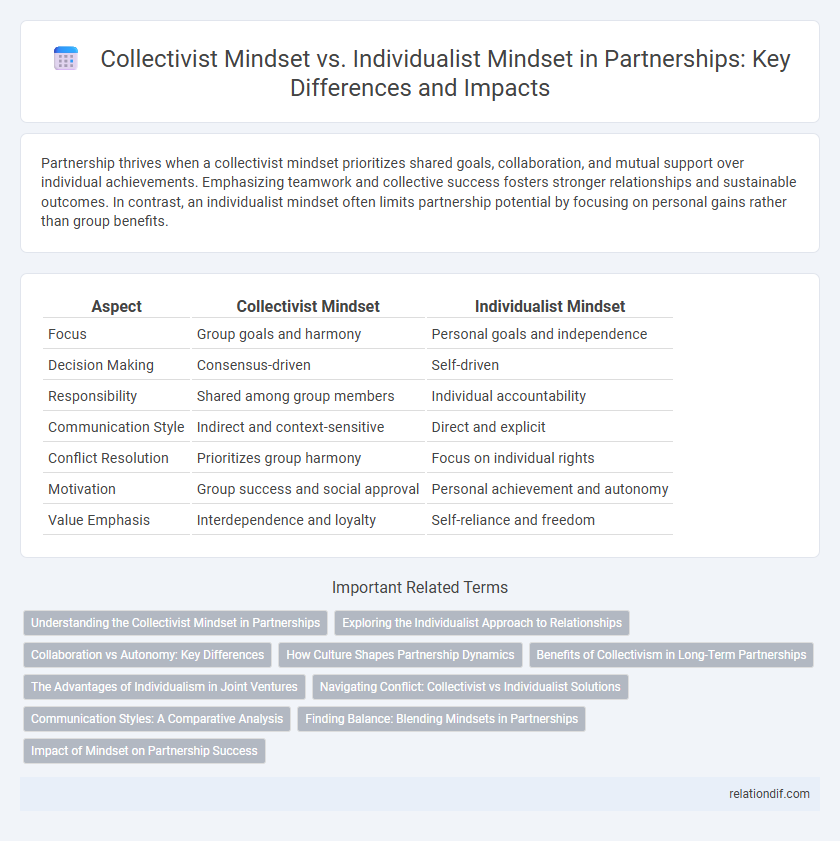Partnership thrives when a collectivist mindset prioritizes shared goals, collaboration, and mutual support over individual achievements. Emphasizing teamwork and collective success fosters stronger relationships and sustainable outcomes. In contrast, an individualist mindset often limits partnership potential by focusing on personal gains rather than group benefits.
Table of Comparison
| Aspect | Collectivist Mindset | Individualist Mindset |
|---|---|---|
| Focus | Group goals and harmony | Personal goals and independence |
| Decision Making | Consensus-driven | Self-driven |
| Responsibility | Shared among group members | Individual accountability |
| Communication Style | Indirect and context-sensitive | Direct and explicit |
| Conflict Resolution | Prioritizes group harmony | Focus on individual rights |
| Motivation | Group success and social approval | Personal achievement and autonomy |
| Value Emphasis | Interdependence and loyalty | Self-reliance and freedom |
Understanding the Collectivist Mindset in Partnerships
The collectivist mindset in partnerships prioritizes group goals, mutual support, and shared success over individual achievement. This approach fosters collaboration, trust, and long-term commitment by emphasizing interdependence and collective well-being. Understanding this mindset enhances communication and conflict resolution, ultimately strengthening the partnership's foundation.
Exploring the Individualist Approach to Relationships
The individualist approach to relationships emphasizes personal autonomy, self-expression, and mutual respect for each partner's independence, fostering growth through clear communication and boundary-setting. In partnerships, prioritizing individual goals alongside shared objectives enhances both personal fulfillment and relationship satisfaction. This mindset encourages partners to collaborate while maintaining distinct identities, leading to more resilient and adaptive connections in diverse social contexts.
Collaboration vs Autonomy: Key Differences
A collectivist mindset emphasizes collaboration, prioritizing group goals, shared responsibilities, and mutual support to achieve common success. In contrast, an individualist mindset values autonomy, encouraging personal initiative, independent decision-making, and self-reliance. Understanding these differences is crucial for fostering effective partnerships that balance teamwork with individual contributions.
How Culture Shapes Partnership Dynamics
Culture profoundly impacts partnership dynamics by influencing whether individuals prioritize collective goals or personal achievements. In collectivist cultures, partnerships emphasize group harmony, shared responsibilities, and long-term relationships, fostering collaboration and mutual support. Individualist cultures prioritize personal initiative and autonomy, shaping partnerships around individual accountability and competitive advantage.
Benefits of Collectivism in Long-Term Partnerships
Collectivist mindsets emphasize shared goals, mutual support, and collaboration, leading to stronger trust and resilience in long-term partnerships. This approach fosters open communication and collective problem-solving, which enhances relationship stability and satisfaction. Embracing collectivism in partnerships results in sustained commitment and increased adaptability to challenges.
The Advantages of Individualism in Joint Ventures
Individualism in joint ventures fosters innovation and agility by empowering partners to leverage their unique expertise and take decisive actions independently. This mindset enhances accountability and motivation, driving partners to contribute their best efforts toward shared goals. Emphasizing individual strengths within a partnership leads to dynamic collaboration and competitive advantage in a global market.
Navigating Conflict: Collectivist vs Individualist Solutions
Navigating conflict within partnerships requires understanding the collectivist mindset, which prioritizes group harmony and collaborative problem-solving, versus the individualist mindset, which values personal goals and direct communication. Collectivist approaches often emphasize consensus-building and preserving relationships, while individualist strategies focus on assertiveness and clear, outcome-driven resolutions. Balancing these perspectives enhances conflict resolution by respecting both communal values and individual needs, fostering stronger, more adaptive partnerships.
Communication Styles: A Comparative Analysis
Collectivist mindsets prioritize group harmony and indirect communication, emphasizing context and nonverbal cues to maintain relationships within partnerships. Individualist mindsets favor direct, explicit communication, focusing on personal goals and clear, concise exchanges to ensure individual accountability. Understanding these contrasting communication styles is crucial for effective collaboration and conflict resolution in diverse business partnerships.
Finding Balance: Blending Mindsets in Partnerships
Balancing collectivist and individualist mindsets in partnerships enhances collaborative success by integrating group harmony with personal initiative. Emphasizing shared goals alongside individual strengths fosters innovative solutions and mutual respect. This blend encourages adaptability and sustained commitment, driving long-term partnership growth.
Impact of Mindset on Partnership Success
A collectivist mindset enhances partnership success by prioritizing shared goals, collaborative problem-solving, and mutual support, which fosters trust and long-term commitment. In contrast, an individualist mindset often emphasizes personal achievement and autonomy, potentially leading to conflicts and fragmented efforts within partnerships. Research indicates that partnerships rooted in collectivist values achieve higher synergy and sustainable impact due to aligned interests and cooperative behavior.
collectivist mindset vs individualist mindset Infographic

 relationdif.com
relationdif.com